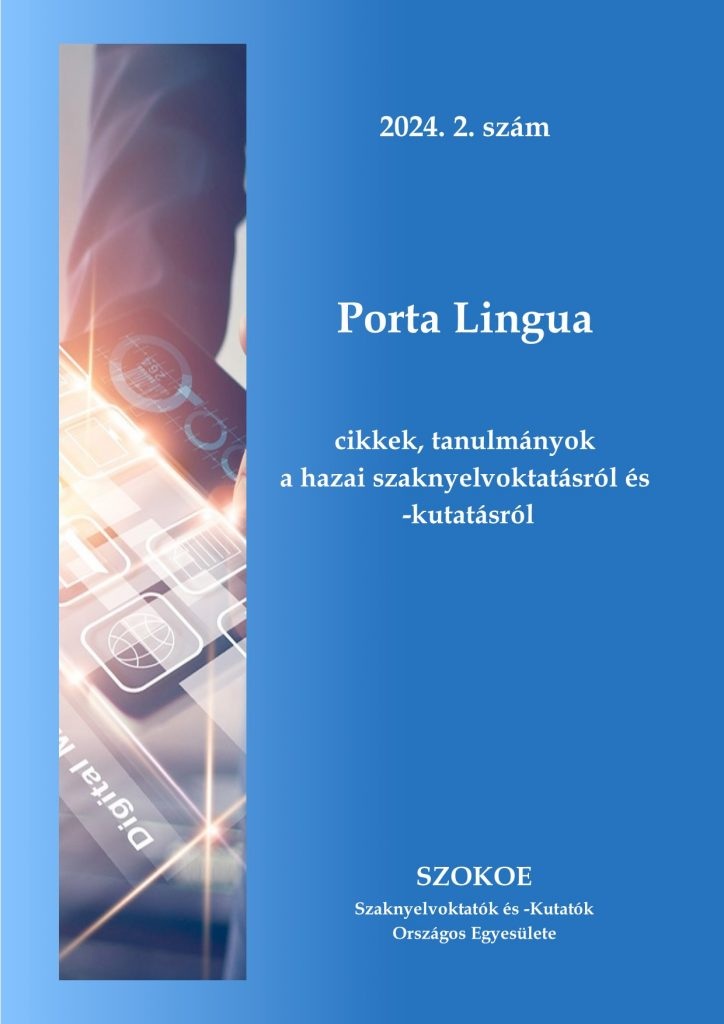The dictionary use habits of university students studying German for special purposes
Abstract
Proper dictionary use is one of the pillars of autonomous L2 learning, and therefore teaching proper dictionary use is also a key element of L2 learning. This is also true for foreign language for special purposes, which is why the mapping and analysis of university students’ dictionary use habits is of great importance. When learning a foreign language for special purposes, it is essential for students to be able to use terminology effectively, and appropriate dictionary use helps students (and later autonomous language users) to express themselves and convey meaning accurately in professional communication. This study introduces a quantitative study and this paper analyses the dictionary use habits of university students studying German for special purposes. The results of our research show that our participants’ willingness to use dictionaries is high, and that they prefer to use bilingual dictionaries in most cases rather than monolingual dictionaries.
References
Adamska-Sałaciak, A. – Kernerman, I. (2016): Introduction: Towards better dictionaries for learners. International Journal of Lexicography. 29/3. 271–278. DOI: https://doi.org/10.1093/ijl/ecw033
Alhatmi, S. (2019): A Survey Study of the Dictionary Use Sub-strategies of English Majors in Saudi Arabia: Dictionary Related Aspects. English Language Teaching. 12/3. 139–160. DOI: https://doi.org/10.5539/elt.v12n3p139
Augustyn, P. (2013): No dictionaries in the classroom: Translation equivalents and vocabulary acquisition. International Journal of Lexicography. 26/3. 362–385. DOI: http://doi.org/10.1093/ijl/ect017
Chan, A. (2011): Bilingualised or monolingual dictionaries? Preferences and practices of advanced ESL learners in Hong Kong. Language, Culture and Curriculum. 24/1. 1–21. DOI: https://doi.org/10.1080/07908318.2010.510196
Chan, A.Y.W. (2012): Cantonese ESL Learners’ Use of Grammatical Information in a Monolingual Dictionary for Determining the Correct Use of a Target Word. International Journal of Lexicography. 25/1. 68–94. DOI: https://doi.org/10.1093/ijl/ecr014
Cohen, L. – Manion, L. – Morrison, K. (2018): Reserach methods in education (8th ed.) Routledge: London. DOI: https://doi.org/10.4324/9781315456539
Ding, J. (2015): A Study of English Majors in a Chinese University as Dictionary Users. Lexicography: Journal of Asialex. 2/1. 5–34. DOI: https://doi.org/10.1007/s40607-015-0016-5
Dringó-Horváth, I. – P. Márkus, K. – Fajt, B. (2020): Szótárhasználati ismeretek vizsgálata német és angol szakot végzettek körében. Modern Nyelvoktatás. 26/4. 16–38.
Dringó-Horváth, I. (2017): Digitális szótárak ‒ szótárdidaktika és szótárhasználati szokások. Alkalmazott Nyelvtudomány. 17/5. 1–27. DOI: http://dx.doi.org/10.18460/ANY.K.2017.005
El-Sayed, N. A. – Siddiek, A. G. (2014): Exploring the English language teachers’ attitudes towards the use of pedagogical dictionaries in their classes (Sudanese perspective). International Journal of Applied Linguistics and English Literature. 3. 171–187. DOI: https://doi.org/10.7575/aiac.ijalel.v.3n.3p.171
Fajt, B. – P. Márkus, K. – Bánhegyi, M. (2024): Attitudes towards dictionary use: A case study of university students studying languages for business. Journal of Adult Learning, Knowledge and Innovation. 7/1. 3848. DOI: https://doi.org/10.1556/2059.2024.00101
Fallianda. (2020): A Survey of Indonesian Students’ Use of Dictionaries. Lexikos. 30. 609–628. DOI: https://doi.org/10.5788/30-1-1607
Gaál, P. (2016): Online szótárak és használóik: Online szótárhasználati kutatások, online szótárak értékelési és minősítési szempontjai. [Doktori disszertáció]: Pécs: Pécsi Tudományegyetem.
Gavriilidou, Z. (2013): Development and validation of the strategy inventory for dictionary use (S.I.D.U). International Journal of Lexicography. 22/2. 135–154. DOI: https://doi.org/10.1093/ijl/ect007
Kegyes, E. (2015): A német mint idegen nyelv és mint szaknyelv pozíciója a vállalati kommunikációban. Alkalmazott Nyelvészeti Közlemények. 10/2. 70–82.
Kosem et al. (2019): The image of the monolingual dictionary across Europe: Results of the European survey of dictionary use and culture. International Journal of Lexicography. 32/1. 92–114. DOI: https://doi.org/10.1093/ijl/ecy022
Leaney, C. (2007): Dictionary activities. Cambridge University Press: Cambridge. DOI: https://doi.org/10.1017/CBO9780511497674
Lew, R. (2016): Dictionaries for learners of English. Language Teaching. 49/2. 291–294. DOI: https://doi.org/10.1017/S026144481500049X
Margalitadze, T. – Meladze, G. (2023): How to solve problems in dictionary use: The Georgian case. Lexikos. 33/2. 63–78. DOI: https://doi.org/10.5788/33-2-1840
Mátyás, J. (2012): Az idegen nyelvű szakirodalom olvasásának jelentősége napjainkban: Német nyelvű szakmai szövegek szótár nélküli olvasásának vizsgálata közgazdász hallgatók körében. Pécsi Tudományegyetem Közgazdaságtudományi Kar: Pécs
Metruk, R. (2017): The Use of Electronic Dictionaries for Pronunciation Practice by University EFL Students. The Journal of Teaching English with Technology. 17/4. 38–51.
Nied Curcio, M. (2022): Dictionaries, foreign language learners and teachers: New challenges in the digital era. In: Klosa-Kückelhaus et al. (eds.) (2022): Dictionaries and society: Proceedings of the XX EURALEX international congress, 12–16 July 2022. IDS-Verlag. 71–84.
P. Márkus, K. – Fajt, B. (2021): Anglisztika szakos hallgatók szótárhasználati szokásai. Új Pedagógiai Szemle. 71/9-10. 24–41.
P. Márkus, K. (2017): A kulturális kompetencia fejlesztése nyelvórán. In: Márkus, É. – M. Pintér, T. – Trentinné Benkő, É. (szerk.) (2017): Jó gyakorlatok a korai idegen nyelvi fejlesztésben és pedagógusképzésben. ELTE TÓK: Budapest. 196–206.
P. Márkus, K. (2019): Szótárhasználati munkafüzetek az oktatásban – használatban a tanulószótárak. Modern Nyelvoktatás. 25/2. 42–62.
P. Márkus, K. (2020): A szótárhasználat jelene és jövője a közoktatásban – a nyelvoktatást szabályozó dokumentumok és segédanyagok tükrében. Modern Nyelvoktatás. 26/1-2. 59–79.
P. Márkus, K. (2022): Jógyakorlatok szerepe a szótárhasználatban. Modern Nyelvoktatás. 28/3-4. 92–109. DOI: https://doi.org/10.51139/monye.2022.3-4.92.109
P. Márkus, K. (2023): Teaching dictionary skills. Károli Gáspár Református Egyetem, L’Harmattan Kiadó.
Peters, P. – Fernández, T. (2013): The lexical needs of ESP students in a professional field. English for Specific Purposes. 32/4. 236–247. DOI: https://doi.org/10.1016/j.esp.2013.05.002
Reder, A. (2016): Wörterbücher und Digitale Tools als Ratgeber bei der Kollokatorsuche. Beiträge zur Fremdsprachenvermittlung. 58. 18–30.
Sándor, E. (2021): What business English education in Hungarian education an learn from BELF research findings. Working Papers in Language Pedagogy. 16. 18–35. DOI: https://doi.org/10.61425/wplp.2021.16.18.35
Sándor, E. (2022): Az angol lingua franca kommunikáció kutatási eredményei és az üzleti angol oktatásának elmélete és gyakorlata. Porta Lingua. 2022/1. 139–147. DOI: https://doi.org/10.48040/PL.2022.1.14
Svensén, B. (2009): A handbook of lexicography. The theory and practice of dictionary-making. Cambridge University Press: Cambridge.
Tremblay, O. – Plante, I. – Fréchette-Simard, C. (2023): Teachers’ self-reported classroom practices regarding dictionary use: The role of teachers’ attitude and school level. International Journal of Lexicography. 36/4. 466–485. DOI: https://doi.org/10.1093/ijl/ecad017



